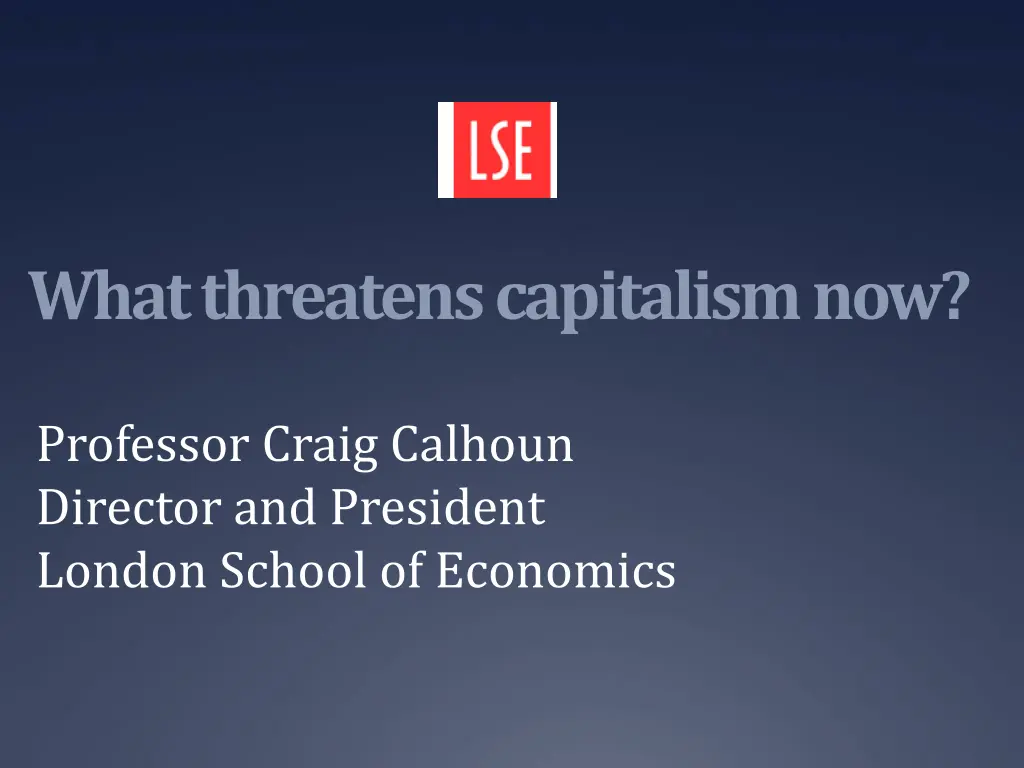
Threats to Capitalism Today: Insightful Analysis by Professor Craig Calhoun
Explore the current challenges to capitalism as discussed by Professor Craig Calhoun, Director and President of the London School of Economics. Delve into the potential transformations, systemic risks, institutional deficits, and environmental pressures facing the capitalist system. Gain valuable insights on the future of capitalism in a rapidly changing global landscape.
Download Presentation

Please find below an Image/Link to download the presentation.
The content on the website is provided AS IS for your information and personal use only. It may not be sold, licensed, or shared on other websites without obtaining consent from the author. If you encounter any issues during the download, it is possible that the publisher has removed the file from their server.
You are allowed to download the files provided on this website for personal or commercial use, subject to the condition that they are used lawfully. All files are the property of their respective owners.
The content on the website is provided AS IS for your information and personal use only. It may not be sold, licensed, or shared on other websites without obtaining consent from the author.
E N D
Presentation Transcript
What threatens capitalism now? Professor Craig Calhoun Director and President London School of Economics
Collapse? Capitalism seems to be surviving a deep and still lingering global crisis A longer period of depressed growth than the Great Depression Predictions of its immanent collapse often highlight genuine weaknesses, but nonetheless are misleading The USSR could collapse because it was a state.
Transformation Capitalism is more likely to be transformed Possibly gaining new resilience Possibly changing beyond recognition State capitalism One system among many The model is not collapse of a state, but more like feudalism giving way to capitalism itself over 300 years. and giving way not simply to capitalism, But to stronger monarchies, empire and nation- states Moreover, capitalism is still growing in much of the world
Thinking from the crisis Close to the precipice Too connected to fail Massive capital injections stopped the spiral. But bailouts triggered fiscal crises. Then fiscal crises triggered political, diplomatic, and social crises, especially in the Eurozone. But lingering unemployment, lack of growth and widespread unhappiness have brought no systemic transformation
Systemic Risk Capitalism in general and the ascendancy of finance Dramatic increase in proportion of financial assets In US, from 25% in 1970s to 75% in 2008 Creative destruction and new technology Asset price bubbles Intensifications of interdependence too connected to fail ?
Institutional deficits Double movement (Polanyi) Dynamism Distribution Inequality and social cohesion Social contract The implicit bargain for growth Loss of legitimacy States, civil society, and even firms
Scarce resources and degraded nature The need for growth and the limits to growth Land Energy Minerals Pollution Climate change Financial non-solutions Cap and trade
Capitalism as an externalization regime The production of wealth and the distribution of illth Public goods Knowledge Environment Migration Informalization
Capitalisms context The return of geopolitics Faultlines of former empires Illicit capitalism Regions, religion and nation-states Cosmopolitanism and belonging The world-system Decline of hegemony Chaos Multilateral leadership
Capitalism is unlikely to collapse next week, but it is also unlikely to last forever. And if it lasts, it will be because it changes
